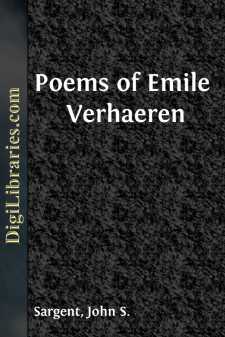Categories
- Antiques & Collectibles 13
- Architecture 36
- Art 48
- Bibles 22
- Biography & Autobiography 813
- Body, Mind & Spirit 142
- Business & Economics 28
- Children's Books 14
- Children's Fiction 11
- Computers 4
- Cooking 94
- Crafts & Hobbies 4
- Drama 346
- Education 46
- Family & Relationships 57
- Fiction 11828
- Games 19
- Gardening 17
- Health & Fitness 34
- History 1377
- House & Home 1
- Humor 147
- Juvenile Fiction 1873
- Juvenile Nonfiction 202
- Language Arts & Disciplines 88
- Law 16
- Literary Collections 686
- Literary Criticism 179
- Mathematics 13
- Medical 41
- Music 40
- Nature 179
- Non-Classifiable 1768
- Performing Arts 7
- Periodicals 1453
- Philosophy 64
- Photography 2
- Poetry 896
- Political Science 203
- Psychology 42
- Reference 154
- Religion 513
- Science 126
- Self-Help 84
- Social Science 81
- Sports & Recreation 34
- Study Aids 3
- Technology & Engineering 59
- Transportation 23
- Travel 463
- True Crime 29
Poems of Emile Verhaeren
by: John S. Sargent
Description:
Excerpt
INTRODUCTORY NOTE.
Emile Verhaeren, remarkable among of the brilliant group of writers representing "Young Belgium," and one who has been recognized by the literary world of France as holding a foremost place among the lyric poets of the day was born at St. Amand, near Antwerp, in 1855. His childhood was passed on the banks of the Scheldt, in the midst of the wide-spreading Flemish plains, a country of mist and flood, of dykes and marshes, and the impressions he received from the mysterious, melancholy character of these surroundings, have produced a marked and lasting influence upon his work. Yet the other characteristics with which it is stamped—the wealth of imagination, the gloomy force, the wonderful descriptive power and sense of colour, which set the landscape before one as a picture, suggest rather the possibility of Spanish blood in the poet's veins—and again, his somewhat morbid subjectivity and tendency to self-analysis mark him as the child of the latter end of our nineteenth century.
Verhaeren entered early in life upon the literary career. After some time spent at a college in Ghent, he became a student at the University of Louvain, and here he founded and edited a journal called "La Semaine," in which work he was assisted by the singer Van Dyck, and by his friend and present publisher, Edmond Deman. He also formed, about this time, a close friendship with Maeterlinck. In 1881, Verhaeren was called to the Bar at Brussels, but soon gave up his legal career to devote himself entirely to literature. In 1883 he published his first volume of poems, and shortly afterwards became one of the editors of "L'Art Moderne," to which, as well as to other contemporary periodicals, he was for many years a contributor. In 1892 he founded, with the help of two other friends, the "Section of Art" in the "House of the People," a popular institution in Brussels, where performances of the best music, as well as lectures upon literary and artistic subjects, were given. In spite, however, of the work which all this entailed, and of the many interests created by his ardent appreciation of the various branches of art and literature, Verhaeren continued to labour unceasingly at his poetical work, and between 1883 and 1897 brought out successively eleven small volumes: Les Flamandes, Les Moines, Les Soirs, Les Débâcles, Les Flambeaux Noirs, Les Apparus dans mes chemins, Les Campagnes Hallucinées, Les Villages Illusoires, Les Villes Tentaculaires, Les Heures Claires, and Les Aubes.
Throughout this entire series the intellectual and spiritual development of the poet may be closely traced—from the materialism which pervades Les Flamandes, and the despairing pessimism and lurid emotion—the throes of a self-centred soul in revolt against fate—which are so powerfully portrayed in Les Débâcles and Les Flambeaux Noirs, and are apparent even in the opening pages of Les Apparus dans mes chemins—to the tender, hopeful mysticism which marks the latter poems in that volume, and the wonderful sympathy with Nature, even in her saddest aspects—the subtle power of endowing those aspects with a profound and ennobling symbolism, which characterise the most beautiful of the poems in Les Villages Illusoires....


